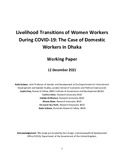Livelihood Transitions of Women Workers During COVID-19: The Case of Domestic Workers in Dhaka

Date
2021-12-12Author
Kabeer, Naila
Huq, Lopita
Aktar, Taslima
Al Mamun, Saklain
Alam, Afsana
Roy Nath, Shravasti
Sultana, Razia
Metadata
Show full item recordImpact
Abstract
The paper draws on primary research into the conditions of domestic workers in Bangladesh and how they coped with the shocks and disruptions associated with COVID-19. We can see our research as a lens to view the lives and livelihoods of workers with no legal or social protection and with the tenuous relationship they have with their employers. The country’s trade unions bypassed these workers during this unprecedented crisis which they had to deal with almost entirely on their own. We carried out detailed qualitative interviews by telephone between January and February 2021 with 30 female domestic workers aged over 18 years. These were “untied” domestic workers who worked for more than one employer and lived in their own accommodation. We asked them to recall their lives and livelihoods before COVID-19 (Jan–Feb 2020), to discuss the period of strict lockdown (Mar–Apr 2020) and then the changes that may have occurred after April when the strict lockdown was lifted. Almost all domestic workers in our study had lost their jobs within a day after the lockdown was announced, pushing them into extreme uncertainty. Since domestic workers were the main breadwinners for most of the households in our sample, the loss of their jobs meant a total or substantial loss of income for at least two-thirds of our respondents. Some domestic workers received government relief, but lack of NID cards and contacts with influential community members made accessing it very difficult and impossible for some.
